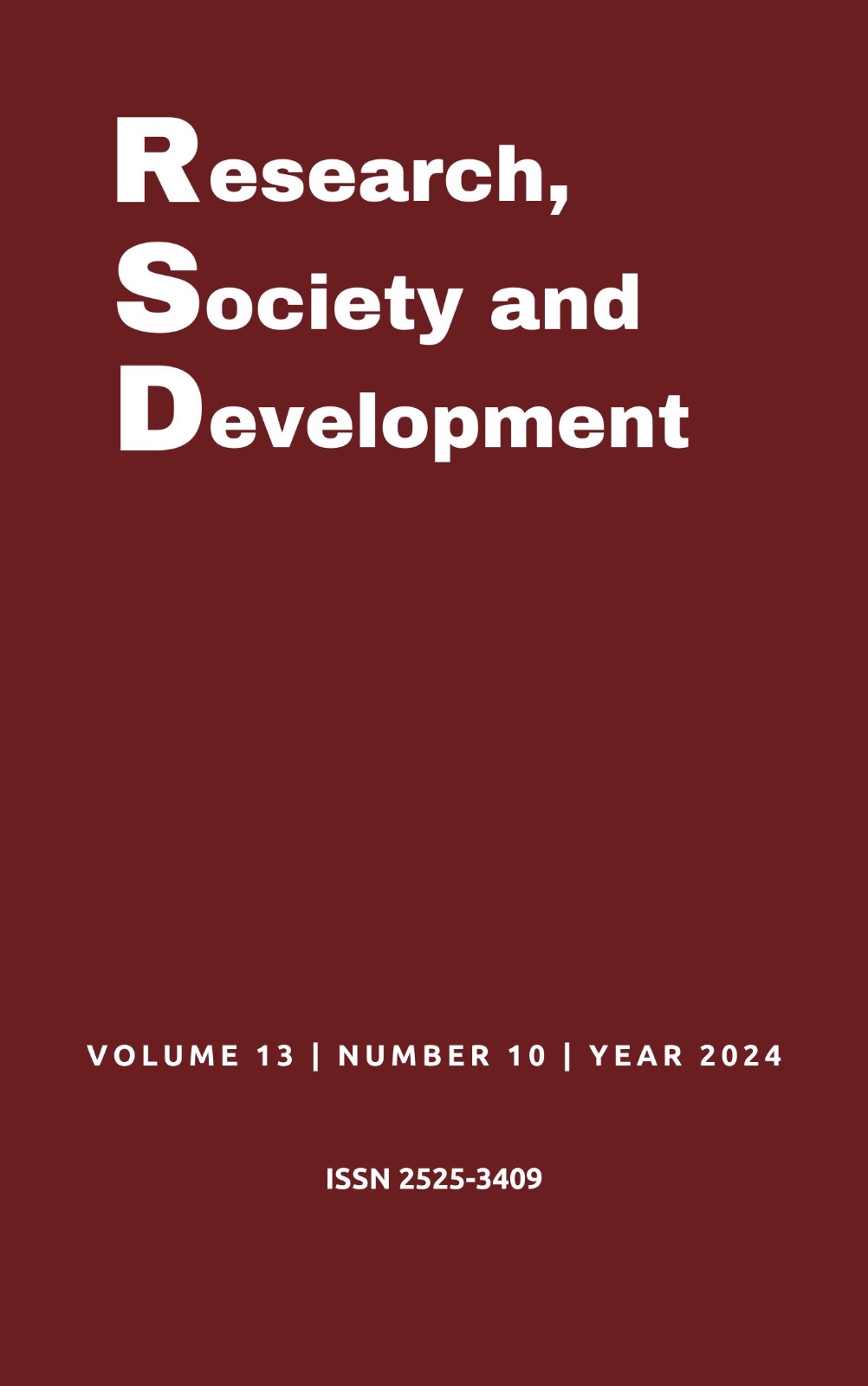Use of digital technology and environmental education with a focus on solid waste in the municipality of Magalhães Barata, Pará State, Brazil
DOI:
https://doi.org/10.33448/rsd-v13i10.47066Keywords:
Environmental Education, Science of Education, Women, RSU, Digital technology.Abstract
The management of Urban Solid Waste in Brazil shows that this approach has a multidimensional character, in view of the involvement of issues related to the environment, economy, culture and social issues, which are seen as waste that is not used. The objective of this study was constructed To report facts about the group of women focusing on solid waste in the municipality of Magalhães Barata in the state of Pará, Brazil. The methodology of this study refers to an ex-post-facto research of a descriptive nature with a qualitative and quantitative approach. Results: in this construction, 17 publications and 4 books of scientific methodology were identified, in which the data were systematized and then the textual body of these studies was constructed. Final considerations: It is observed that the municipality of Magalhães Barata/PA, should create stricter laws regarding the disposal of Urban Solid Waste – MSW. Thus, with the use of digital technology and environmental education for citizens, they would be economically viable actions that can contribute to the mitigation of an environmentally appropriate final disposal of MSW generation.
Downloads
References
Amarante, C. V. (2020). Educação Ambiental e Gênero: a IV conferência mundial sobre a mulher. XXV Encontro Estadual de História da Anpuh-Sp. 1-10. https://www.encontro2020.sp.anpuh.org/resources/anais/14/anpuh-sp-erh2020/1597799167_ARQUIVO_da34ad6e5987dd390f5e7235de758545.pdf.
Amaro, L.; Silva, G. R. & Martins, I. C. (2021). Gestão de Resíduos Sólidos Urbanos e o Desenvolvimento Sustentável: uma revisão. Environmental Scientiae. 2(1). 48-57, https://www.researchgate.net/publication/348541805_A_gestao_de_residuos_solidos_urbanos_e_o_desenvolvimento_sustentavel_uma_revisao.
Araújo, V. D. (2022). Diagnóstico da Gestão dos Resíduos Sólidos Urbanos do Município de Caicó/RN. Dissertação de Mestrado em Gestão Pública. 1-68. https://repositorio.ufrn.br/bitstream/123456789/50865/1/Diagnosticogestaoresiduos_Araujo_2022.pdf.
Abrelpe, Associação Brasileira de Empresas de Limpeza. (2021). Panorama de Resíduos Sólidos no Brasil. 1-64 https://abrelpe.org.br/panorama-2021/.
Brasil, (2021). Plano de Gerenciamento de Resíduos Sólidos - PGRS: 2022-2023/Senado Federal. Brasília: Senado Federal. Brasília: DF. 1- 44 https://www12.senado.leg.br/transparencia/gestgov/planejamento-estrategico-1/plano-de-gestao-de-logistica-sustentavel-do-senado-federal/pgrs/PGRS20222023BASF.pdf.
Brasil, (2022a). Decreto nº 10.936 de 12 de janeiro de 2022. Regulamenta a Lei no 12.305, de 2 de agosto de 2010, que institui a Política Nacional de Resíduos Sólidos. Brasília, DF: Palácio do Planalto.
Brasil, (2022b). Plano de Gerenciamento de Resíduos Sólidos. 1ª versão 2022. Ministério Público do Estado do Piauí, 2022ª. https://www.mppi.mp.br/internet/wp-content/uploads/2022/10/PGRS-MPPI.pdf.
Brasil, (2010). Lei no 12.305, de 2 de agosto de 2010, Institui a Política Nacional de Resíduos Sólidos. Brasília, DF: Palácio do Planalto. http://www.planalto.gov.br/ccivil_03/_Ato2007-2010/2010/Lei/L12305.htm.
Brasil, (2004). NBR 10004: Resíduos sólidos - Classificação. Rio de Janeiro-RJ.
Castro, A. M.; Ferreira, C. T. & Moreira, R. B. (2021). Mulheres: Organização, Resistência e Sobrevivência na Catação de Material Reciclável. Revista Latino-Americana de Geografia e Gênero. 12(2).19¬38. ISSN 2177¬288. Revista Latino-Americana de Geografia e Gênero (uepg.br).
Camardelo, A. M. P. Benedetti, A. & Nostrane, K. C. (2020). Mulheres e relações de gênero na catação de resíduos sólidos: uma revisão sistemática. RECIMA21 - Revista Científica Multidisciplinar. 1(2).179-193. DOI:
https://doi.org/10.47820/recima21.v1i2.39 https://recima21.com.br/index.php/recima21/article/view/39
Camardelo, A. M. P.; Benedetti, A. & Nostrane, K. C. (2023). Catação de Resíduos Sólidos: um estudo sobre mulheres catadora. Gênero. Niterói: RJ; 23(2). 94-113. DOI: https://doi.org/10.22409/rg.v23i2.50841 https://periodicos.uff.br/revistagenero/article/view/50841
Gil, A. C. Como Elaborar Projeto de Pesquisa. São Paulo: Atlas, 2002.
Ladeira, P. S. S. & Pacheco, E. B. A. V. (2023). Identificação de Tecnologias de Tratamento de Resíduos Sólidos Contaminados com Óleo em Atendimento á Economia Circular. Paper Review. 5(2). 401- 403 https://peerw.org/index.php/journals/article/view/1220/753.
Lakatos, Eva Maria. Fundamentos de Metodologia Científica. 5. ed. São Paulo: Atlas 2021.
Pereira A. S. et al. (2018). Metodologia da pesquisa científica. [free e-book]. Santa Maria/RS. Ed. UAB/NTE/UFSM.
Robaina, J. V. L. Fenner, R. S. Martins, L. A. M. Barbosa, R. A. Soares, J. R. et. al. (2021). Fundamentos Teóricos e Metodológicos da Pesquisa em Educação 1. ed. em ciências. 1.ed. – Curitiba, PR: Bagai.
Santos, J. F.; Jesus, E. S. P.; Lima, D. M. F. S.; Lima, J. C. F. S.; Santos, L. M. et al. (2023). Gestão dos resíduos sólidos urbanos no município de Malhada – BA. Revista de Tecnologia & Gestão Sustentável. 2(5). 137-148. https://www.academia.edu/103832363/Gestão_dos_resíduos_sólidos_urbanos_no_município_de_Malhada_BA.
Silva, L. N.; Lopes, N. V. B. M. B. & Wiziack, S. R. C. (2023). Geofronter. Campo Grande. Dossiê Meio Ambiente e Educação Ambiental. 9. 01-14. https://www.researchgate.net/publication/374496554_EDUCACAO_AMBIENTAL_E_MULHERES_UM_DIALOGO_DECOLONIAL_NECESSARIO_E_POSSIVEL.
Silva Sobrinho, L. H. R. (22021). Estudo para Aplicação da Tecnologia de Aproveitamento Energético de Resíduos Sólidos Urbanos: um estudo de caso para o município de Magé/RJ. COPPE RJ. Dissertação de Mestrado em Planejamento Energético; 1-109 https://www.ppe.ufrj.br/images/publicações/mestrado/Dissertação_Luiz_Henrique_Sobrinho.pdf.
Zago, V. C. P. & Barros, R. T. V. (2019). Gestão dos resíduos sólidos orgânicos urbanos no Brasil: do ordenamento jurídico à realidade. Eng. Saneamento Ambiental. 24(02) https://www.scielo.br/j/esa/a/MY53xbTzPxYhz783xdmKc8F/#.
Downloads
Published
Issue
Section
License
Copyright (c) 2024 Junia Marise Silva de Sousa

This work is licensed under a Creative Commons Attribution 4.0 International License.
Authors who publish with this journal agree to the following terms:
1) Authors retain copyright and grant the journal right of first publication with the work simultaneously licensed under a Creative Commons Attribution License that allows others to share the work with an acknowledgement of the work's authorship and initial publication in this journal.
2) Authors are able to enter into separate, additional contractual arrangements for the non-exclusive distribution of the journal's published version of the work (e.g., post it to an institutional repository or publish it in a book), with an acknowledgement of its initial publication in this journal.
3) Authors are permitted and encouraged to post their work online (e.g., in institutional repositories or on their website) prior to and during the submission process, as it can lead to productive exchanges, as well as earlier and greater citation of published work.


